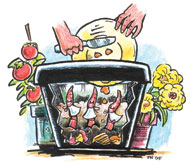Joseph Kimani: Swimming against the tide
Vince Lombardi can't really be blamed for the "win-at-all-cost" attitude embraced by so many current North American athletes and fans, but he certainly can be credited with coining the mantra for our victory-obsessed generation. "Winning isn't everything," the legendary coach of the NFL's Green Bay Packers famously growled, "it's the only thing."

Geography student and information technology trainer Joseph Kimani swam in his first World Championships last year in Indianapolis.
Claudio Calligaris
Call Joseph Kimani the anti-Lombardi. Competing for Kenya at World Aquatics Championships in Montreal last August, the McGill geography student and IT trainer finished 85th out of a field of 97 in the 50 m breaststroke and 56th out of 57 in the 200 m individual medley (IM). To put it in perspective, had Kimani been in the 200 m IM finals (he was eliminated in the first heat), gold medalist Michael Phelps would have been out of the pool and signing autographs before Kimani had even made his final turn. Kimani shrugs and smiles at this prospect. "Winning isn't everything," he says. "Striving to make yourself better is what really counts."
Kimani learned this lesson from Shirley Maina, his last swim coach back home in Nairobi. "She focused on each swimmer, regardless of their results. In her eyes, there were no superstars," he says. "She taught me to focus on improving myself and not to worry about other people. She's one of my life heroes."
Perhaps Kimani speaks so highly of his former coach because, as a boy, he had very few adult role models. His father left home when Kimani was just seven, and five years later Kimani's mother died of cancer. The four children (Kimani is the youngest) learned to fend for themselves. "I cooked and cleaned and even picked up my own report cards. They were tough times. But I solved a lot of problems in the pool."
Swimming became his refuge, a fairly strange choice in a country that has been the breeding ground of some of history's greatest distance runners. Kimani, who shares the name of a world-record-holding road racer, preferred the freedom he found in water.
He moved to Montreal six years ago to begin his BA in geography at McGill. When he joined the McGill swim team, he realized there was a lot of work to do. "I was always close to last," he remembers, "but I kept working hard and my results kept getting better."
Money started getting tough in his second year and, rather than apply for financial aid, Kimani got a job at McGill. Today, he works full-time as an IT trainer, continues his studies on a part-time basis and still manages to put in six sessions in the pool a week - even more leading up to this year's World Championships. During the competition, Kimani's boss, Cathy Wilmot, ICS customer services, gave him mornings off so he could compete in his two heats. World championships in the morning, back at the job in the afternoon.
In swimming terms, the 27-year-old Kimani is a greybeard. Friends and family often ask him why he continues to compete, long after fellow competitors have hung up their goggles. Why not do away with the twice-a-days and concentrate on school or work?
Like so many athletes, Kimani's immediate goal - he doesn't call it a dream - is to make the Olympics. As can be expected from someone who learned to be self-sufficient at such a young age, Kimani has a very specific plan to attain that goal. As per plan, the road to Beijing in 2008 will pass through Melbourne, Australia, at next year's Commonwealth Games.
However, there's something bigger at work in Kimani, bigger even than the Olympics. "In the last three years I've swam the best times of my life. I feel like I can still improve. For 20 years I've been breathing on my left during freestyle. Maybe for the next 20 I'll try breathing on my right and see if it helps me get better. I want to swim forever."
Unlike so many of today's overpaid athletes, who seem entirely self-obsessed, Kimani has a vision that extends well beyond his immediate environment. He wants to make a difference. "I want to inspire young swimmers in Kenya. I'm not a star, but I want them to look at me and say 'Look, it's possible to reach one's goals'."
One hopes that even a success-driven man like Lombardi would have looked upon Kimani and recognized the glory of his travails. He would have understood that effort is not always validated by medals and that trophy cases can never hold the true essence of a man. "If you'll not settle for anything but your best, you will be amazed at what you can accomplish in your lives," Lombardi is much less-famously quoted as saying. Yes, that Lombardi would have understood. In fact, that Lombardi would have been the first person poolside reaching down to offer Kimani his hand.
As the worm turns
Vermicomposting turns household garbage into rich fertilizer

Jack Ruttan
Derina Man gave a friend worms for her birthday. A whole pound of worms. Rather than giving Man the "Ahhhhh, you shouldn't have" routine, her friend was thrilled. And why not? The worms were part of a vermicomposter, an increasingly popular method of composting that Man is promoting around campus as a student and member of Greening McGill.
Essentially, a vermicomposter is a plastic container full of hungry worms, red wrigglers to be exact. The voracious little squirmers are nature's perfect environmentally friendly disposal units, chowing down on all sorts of household refuse including fruit peels, tea bags, shredded newspaper, eggshells and used matchsticks. During digestion, food scraps and dust bunnies are broken down into usable fertilizer, called castings.
These castings are rich in nitrogen, phosphorous and potassium, excellent for house plants and gardens. What could be better than greatly reducing your contribution to garbage landfills, all the while adding more zing to your zinnias?
Because the units are odorless and about the size of a small laundry hamper, vermicomposters are perfect for urban settings, especially apartments. A fiberglass netting inside the unit keeps most worms from making a break for freedom. When asked if the occasional escapee would pose a threat to children or pets, Man says, "They don't frequently attack." She is quick to add that the worms are entirely non-toxic.
Depending on the size of the unit, vermicomposters cost between $35 and $55. The beauty of the system is, once your vermicomposter is up and crawling, you never have to buy more worms. Fat worms are healthy worms and healthy worms love making baby worms. If your vermicomposter experiences a slight population explosion, even better - worms make the perfect birthday present.
For more information, contact Derina Man at dman1@po-box.mcgill.ca.

